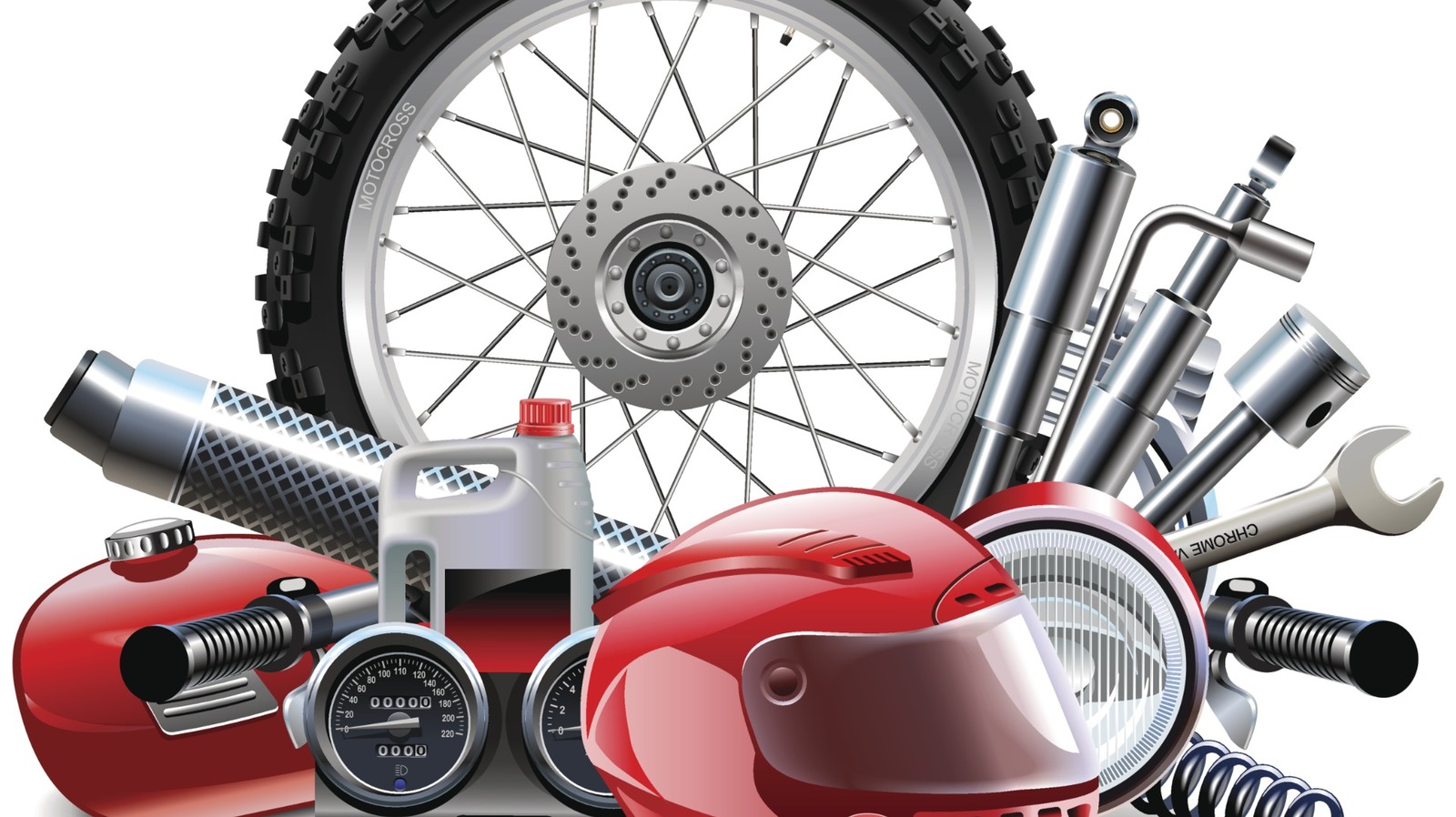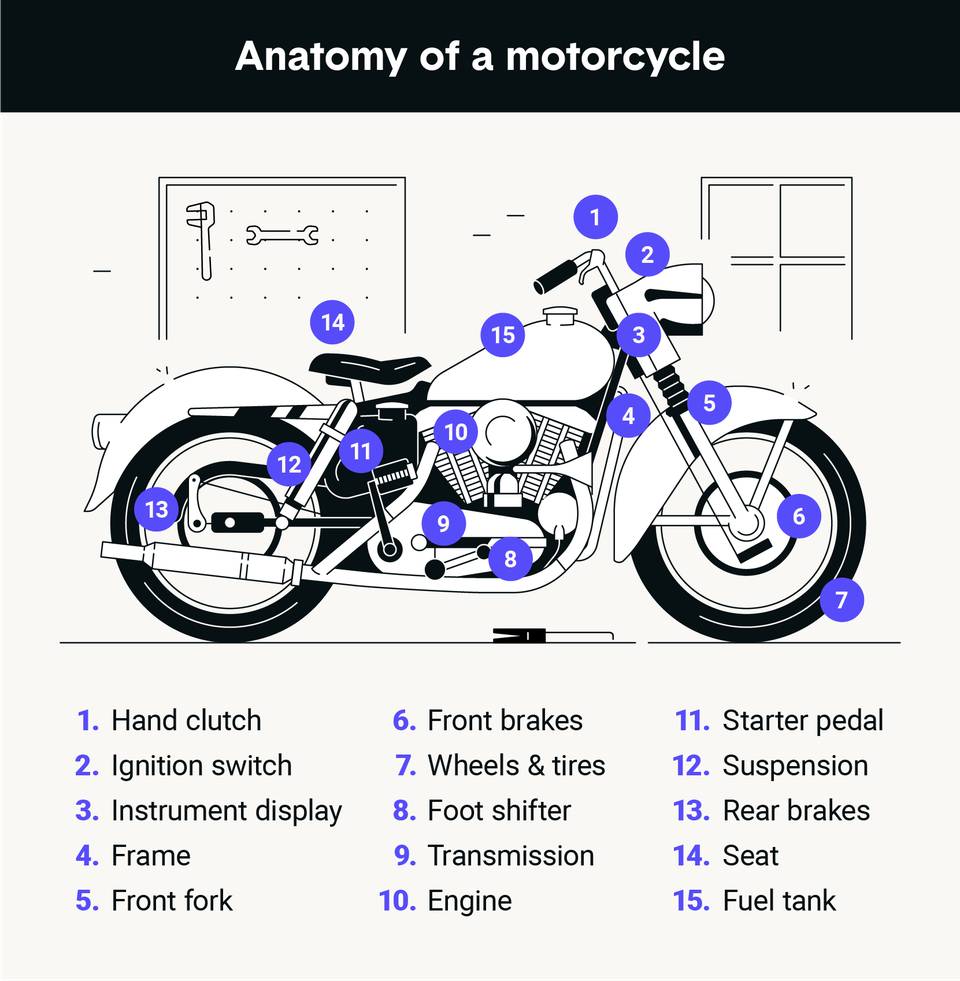Troubleshooting Common Issues in Your OEM Parts New Zealand Setup
Troubleshooting Common Issues in Your OEM Parts New Zealand Setup
Blog Article
Discover the Essential Motorcycle Parts You Required for Optimum Performance
Comprehending the important parts of a bike is fundamental for accomplishing peak efficiency. Each component, from the engine to the braking system, plays an essential role in general capability and safety and security. Routine upkeep can stop unforeseen failures and boost the riding experience. Nevertheless, several riders neglect the intricacies of these systems. Discovering how they interact can bring about an extra efficient trip. What important parts should every cyclist focus on?
The Engine: The Heart of Your Bike
The engine functions as the core part of a bike, driving its efficiency and specifying its abilities. It is in charge of transforming gas right into power, which powers the bike ahead. Different kinds of engines are utilized, including single-cylinder, V-twin, and inline configurations, each offering distinct characteristics suited for various riding designs and objectives. The engine size, generally measured in cubic centimeters (cc), considerably affects efficiency, with larger engines typically offering more power and torque.Furthermore, the engine's layout and innovation, such as gas injection systems or air-cooling versus liquid-cooling, influence effectiveness and integrity. Upkeep is essential for peak procedure; elements like normal oil modifications and checking trigger connects guarantee longevity. Cyclists commonly think about an engine's responsiveness and smoothness, as these features improve the overall riding experience. Ultimately, the engine continues to be an essential aspect that defines not just the motorcycle's efficiency however additionally the motorcyclist's connection to the equipment.
The Transmission: Moving Gears Efficiently
The transmission plays a necessary role in a motorcycle's performance, especially in the mechanics of equipment shifting. Comprehending how to move equipments smoothly can boost the overall riding experience, while normal upkeep assurances peak functionality. Appropriate focus to these aspects can substantially affect the long life and efficiency of the bike.

Equipment Shifting Mechanics
Smooth gear changing is essential for optimal motorbike performance, greatly affecting both velocity and control. The technicians of equipment changing include the communication in between the clutch, equipment lever, and transmission system. When a motorcyclist involves the clutch, it disengages the engine from the transmission, enabling an equipment modification without harming the elements. A well-timed launch of the clutch, combined with exact movement of the gear bar, facilitates a seamless adjustment in between gears. This procedure ensures that the engine runs within its finest power band, boosting performance. Motorcycle Spares Christchurch. Furthermore, recognizing the equipment ratios and their impact on speed and torque can help cyclists make notified options throughout changes, ultimately adding to a more satisfying and responsive riding experience
Upkeep Tips Value
Regular upkeep plays a crucial function in assuring that the transmission system runs successfully, enabling smooth equipment shifts. On a regular basis examining and changing the transmission liquid is essential, as old liquid can result in raised friction and wear. Additionally, inspecting the clutch for wear warranties peak engagement and disengagement, preventing slippage during gear changes. Lubrication of moving parts is equally important to lower rubbing and improve efficiency. Motorcycle proprietors must likewise keep an eye on for leaks and uncommon noises, as these can indicate underlying problems. By adhering to these upkeep tips, riders can extend the life expectancy of their transmission system, guaranteeing that gear changes remain smooth and adding to the total efficiency of their motorcycle.
The Braking System: Ensuring Security on Every Trip
Braking systems are basic elements that straight affect a motorbike's safety and performance. They contain numerous parts, including brake pads, rotors, calipers, and hydraulic lines, all interacting to assure efficient slowdown. The kind of stopping system-- commonly either disc or drum-- influences responsiveness and stopping power.Regular upkeep is important to support peak efficiency; worn brake pads can bring about lowered performance and raised stopping distances. Additionally, the top quality of brake liquid should be monitored, as it can absorb moisture gradually, compromising stopping efficiency.Riders must likewise take into consideration the relevance of anti-lock stopping systems (ABS), which protect against wheel lockup throughout sudden quits, boosting general safety. Appropriately working brakes are not nearly quiting; they infuse self-confidence in the cyclist, permitting safer navigation through numerous terrains. Inevitably, a reputable stopping system is crucial for appreciating every ride with comfort.
The Suspension: Enhancing Comfort and Control
A well-functioning shock absorber substantially adds to a motorcycle's total efficiency, enhancing the effectiveness of the braking system. The suspension plays a significant duty in soaking up shocks from unequal surface areas, guaranteeing a smoother trip while maintaining tire call with the roadway. This contact is vital for both stability and control, allowing riders to browse corners with self-confidence and precision.Different kinds of suspension systems, such as telescopic forks or mono-shocks, provide differing levels of comfort and handling. Appropriately tuned suspension boosts responsiveness, providing the biker with a much more connected feeling to the motorcycle. Routine upkeep checks are essential to identify the suspension components, including dampers and springtimes, are working at their finest. A reliable suspension system not only boosts the riding experience however additionally adds to the longevity of various other motorbike parts by decreasing damage. Because of this, spending in quality suspension is crucial for any major motorcycle enthusiast.
The Tires: Attaching You to the Road
Tires play an essential duty in a motorbike's performance, working as the key link in between the roadway and the rider. Understanding the various kinds of tires readily available can greatly impact handling and safety and security. Furthermore, regular upkeep is essential to ensure peak tire efficiency and long life.
Tire Types Explained
Just how do various tire kinds influence a motorcycle's efficiency? Tire kinds play a crucial role in determining a motorcycle's handling, stability, and grasp. Sport tires, made for high efficiency, deal improved traction and responsiveness on smooth roads, making them ideal for racing and hostile riding. Alternatively, exploring tires prioritize durability and comfort, providing a smoother ride for long-distance traveling. Off-road tires, defined by their tough tread patterns, master traction on unpaved surface areas, appropriate for experience fanatics. Additionally, dual-sport tires blend characteristics from both off-road and on-road categories, dealing with functional riding demands. Eventually, picking the ideal tire kind is crucial for maximizing performance, guaranteeing security, and improving the overall riding experience.
Upkeep Tips Offered
While riding on the road, maintaining perfect tire problem is important for safety and efficiency. Frequently checking tire pressure is necessary, as under-inflated tires can lead to bad handling and boosted wear. It is recommended to inspect step depth regularly; used tires compromise hold and stability. On top of that, click for more info cyclists must try to find signs of damages, such as bulges or cracks, which can indicate the requirement for substitute. Revolving tires periodically assures even wear, boosting longevity. Keeping tires clean from particles and preventing too much visuals can extend their lifespan. Maintaining correct placement and balance contributes to come to a head performance, decreasing tension on other bike elements. Following these maintenance tips will substantially enhance the total riding experience.
The Fuel System: Fueling Efficiency and Efficiency
The fuel system plays a vital duty in making the most of a motorbike's efficiency and effectiveness, as it ensures the ideal delivery of fuel to the engine. It comprises a number of crucial components, including the gas storage tank, gas pump, gas filter, and fuel injectors or carburetor. Each part has to operate effectively to guarantee a smooth and powerful ride.The gas tank shops fuel and supplies it to the engine via the fuel pump, which creates the necessary stress. A fuel filter prevents impurities from entering the engine, while the injectors or carburetor mix gas with air for combustion.Proper maintenance of the fuel system is vital; a blocked filter or malfunctioning injector can cause decreased efficiency and raised gas intake. By verifying that the fuel system operates efficiently, riders can enjoy improved throttle feedback, better gas economy, and generally boosted riding experience.
The Electrical System: Powering Your Experience
An efficient electric system is crucial for the total performance and safety of a motorcycle, as it powers important parts such as the ignition, illumination, and numerous electronic systems. This system includes the battery, which stores power, and the alternator, in charge of creating power while the engine runs. The wiring harness links these components, ensuring reputable power distribution.Additionally, fuses shield the system from overloads, while relays assist manage high-current devices with low-power signals. A properly maintained electrical system boosts efficiency by making sure smooth begins and regular operation of signals and lights, vital for rider exposure and safety.Regular checks of the battery's charge and connections are essential for avoiding electric failings. Motorcyclists should additionally examine circuitry for wear and tear, making certain all components work preferably. Inevitably, a durable electrical system contributes significantly to the total performance and reliability of the motorcycle.
Regularly Asked Concerns
Exactly how Usually Should I Change My Motorcycle's Battery?
The regularity of motorbike battery substitute depends on use and upkeep (Bike Parts Wellington). Normally, batteries must be changed every 3 to 5 years. Regular checks can assist determine when a replacement is essential for peak performance
What Devices Do I Required for Standard Bike Maintenance?
For standard motorbike maintenance, one needs crucial devices such as a socket collection, wrenches, screwdrivers, pliers, tire pressure scale, and a torque wrench. These tools promote efficient upkeep and assure the motorbike runs efficiently and safely.
Just How Can I Enhance My Motorcycle's Aerodynamics?
To improve bike the rules of aerodynamics, one must take into consideration readjusting fairings, utilizing windscreen extensions, enhancing body setting, and minimizing total weight. These alterations assist reduce drag, enhancing stability and gas efficiency throughout adventures.
What Are the Indications of a Failing Electrical System?
Signs of a failing electric system consist of dimming lights, problem starting, irregular instrument analyses, and blown integrates. Motorcycle Parts Auckland. Unusual scents or rust around battery terminals may also show underlying problems requiring immediate interest for security and efficiency

Exactly how Do I Choose the Right Oil for My Motorbike?
When selecting oil for a motorbike, one click now ought to take into consideration the producer's requirements, viscosity ratings, and the type of riding. Additionally, standard versus synthetic oil can influence performance and engine protection, influencing the decision considerably. The engine size, usually measured in cubic centimeters (cc), substantially influences directory efficiency, with larger engines generally providing even more power and torque.Furthermore, the engine's design and innovation, such as gas injection systems or air-cooling versus liquid-cooling, influence performance and integrity. A well-functioning suspension system substantially adds to a motorcycle's overall efficiency, complementing the performance of the braking system. The fuel system plays an important duty in making best use of a motorcycle's efficiency and effectiveness, as it assures the optimum shipment of fuel to the engine. A fuel filter prevents contaminants from entering the engine, while the injectors or carburetor mix gas with air for combustion.Proper upkeep of the gas system is important; a blocked filter or malfunctioning injector can lead to reduced efficiency and raised fuel intake. A well-maintained electric system improves performance by making certain smooth beginnings and consistent operation of lights and signals, important for biker exposure and safety.Regular checks of the battery's charge and connections are crucial for stopping electric failures.
Report this page